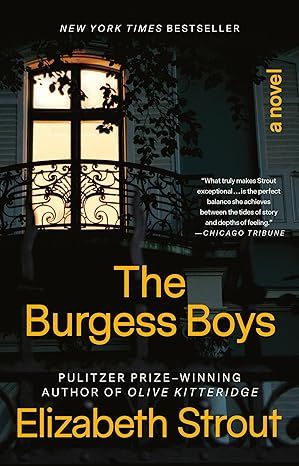The Burgess Boys: A Novel
4.1 out of 5
11,063 global ratings
NEW YORK TIMES BESTSELLER • From the Pulitzer Prize–winning author of Olive Kitteridge and My Name is Lucy Barton comes “a portrait of an American community in turmoil that’s as ambitious as Philip Roth’s American Pastoral but more intimate in tone” (Time).
“What truly makes Strout exceptional . . . is the perfect balance she achieves between the tides of story and depths of feeling.”—Chicago Tribune
A BEST BOOK OF THE YEAR: The Washington Post, NPR, Good Housekeeping
Haunted by the freak accident that killed their father when they were children, Jim and Bob Burgess escaped from their Maine hometown of Shirley Falls for New York City as soon as they possibly could. Jim, a successful corporate lawyer, has belittled his bighearted brother their whole lives, and Bob, a Legal Aid attorney who idolizes Jim, has always taken it in stride. But their long-standing dynamic is upended when their sister, Susan—the Burgess sibling who stayed behind—urgently calls them home, where the long-buried tensions that have shaped and shadowed the brothers’ relationship begin to surface in unexpected ways that will change them forever.
This edition includes an original essay by Elizabeth Strout about the origins of The Burgess Boys.
352 pages,
Kindle
Audiobook
Hardcover
Paperback
Audio CD
First published April 7, 2014
ISBN 9780812979510
About the authors
Elizabeth Strout
Elizabeth Strout is the author of the New York Times bestseller Olive Kitteridge, for which she was awarded the Pulitzer Prize; the national bestseller Abide with Me; and Amy and Isabelle, winner of the Los Angeles Times Art Seidenbaum Award and the Chicago Tribune Heartland Prize. She has also been a finalist for the PEN/Faulkner Award and the Orange Prize in London. She lives in Maine and New York City.
Read more
Reviews
Drwo
5
A Family So Real You Might Think It's Your Own
Reviewed in the United States on May 6, 2013
Verified Purchase
Jim and Bob Burgess grew up in tiny Shirley Falls, Maine. As the story begins, they are both now lawyers living in New York. Jim, the elder, is a partner in a big name firm, married to a Waspy heiress and they have three kids in college. Jim lives in an elegant brownstone in Brooklyn. Bob is divorced with no children and writes appeals for indigents so he never needs to appear in court. He is overweight, drinks too much and lives in a dumpy apartment. The brother's dynamic was set in early childhood when their father left them alone in a car. Bob, in the front seat, put the car in gear, and it accelerated, running over their father, killing him, and leaving their mother with 3 small children to raise.
Susan, their sister, has never left Shirley Falls. Divorced, she lives a meager existence with her sullen son, Zach, who works at a Walmart. Shirley Falls, for reasons which are not clear, has become a destination for refugees from Somalia and there is racial tension, if not outright belligerence. Each population is wary of the other. During a Ramadan prayer service at the Shirley Falls mosque, someone throws a pig head in the front door, creating terror in the Somalis, amusement in the police who are first called, and outrage from the press who turn the incident into a news story with legs.
Jim and his wife, Helen, sipping wine in their brownstone in Brooklyn, are packing for a vacation at a swanky resort in the Caribbean, accompanied by Jim's boss and the bosses wife. Bob has stopped by for a drink and the three are about to walk to a restaurant for dinner when an hysterical Susan calls asking for Jim. Zach has confessed to his mother that it was he who threw the pig head into the mosque. He is terrified and can't believe it is national news as he only did it "as a joke." Jim is disgusted with his nephew and angry that he might have to give us his vacation to go to Shirley Falls to deal with what he believes is a tempest in a teapot misdemeanor. After a heated conversation, Bob agrees to go to Shirley Falls to deal with the situation there and Jim and Helen head for their island vacation.
While Bob and Jim see the incident as annoying, an assistant D.A. sees a career making trial if she can get the pig-head incident declared a hate crime. When Bob arrives in Shirley Falls, he takes Zach to the police station to turn himself in. Zach is whisked away but Bob, seeing no real problem, believes Zach will be sent home and end up paying a fine or doing community service. Meanwhile, forces are at work to make sure Zach goes to trial as perpetrating a hate crime and that he does jail time.
The story is told from several perspectives: Helen's, Bob's, Jim's, and one of the Somali's. We learn about the lives of each character beyond their connection to each other. What made this book for me was the dialogue. The conversations are so crisp and real, if a movie is made of the book, the script is already written.
There are no heroes, no villains, but rather people with opinions and beliefs that cloud their thinking and affect their behavior. For all their dissimilar natures, the Burgess family is still a family and the outcome is never really in doubt - hardly likely that Zach will do serious time over the pig-head incident. If there is a moral here, it is that pig-headed describes most of us who cling to our resentments and denials or our rose colored glasses and it sometimes takes a family crisis to put our lives back in perspective or to face an unpleasant reality. I loved it. You should read it.
Read more
21 people found this helpful
Digital Rights
5
My favorite Strout so far
Reviewed in the United States on February 6, 2024
Verified Purchase
I've read about half of Elizabeth Strout's books. This is my favorite so far. The Lucy Barton books were rewarding in a different way; in what is not said and the quiet parts between the lines. I'd say this is the opposite. The characters - the three Burgess siblings; Jim, Bob and Susan are anything but understated. Each is a devil of a person to understand; rigid in their own ways and carrying a lot of baggage, resentments and either a chip on the shoulder or a whimper of humiliation. How they work through 50 years of slowly piling on the slights, silences and insults is what this is all about and it's so compelling. There is lots going on. Wives, ex-wives, ex-husbands and children linger around the edges. No one is 100% nice and the author plays well to the ideas of memory, interpretation and characters where you can love and hate them as you turn the page. I absolutely was riveted throughout and rank this very highly as a very satisfying read.
My order of books The Burgess Boys Olive Again My Name is Lucy Barton Oh William Lucy By the Sea Olive Kitteridge
Read more
Laura
5
An Amazing Novel. A Brilliant Read
Reviewed in the United States on August 10, 2024
Verified Purchase
How does a writer capture the complexities, the connections and ironies of our humanity with such understanding and grace? Elizabeth Strout’s creativity and skill as well as love of people has enabled this. Working on both the micro and the macro levels, the personal and the universal levels, Strout narrates the story of a family caught up in personal tragedies against the background of a nation and a world facing their own struggles. The interconnections are revealed. Additionally, Strout provides deep insights into this micro/macro relationship and uncovers possibilities for redemption. A beautiful novel.
Read more
aPriL does feral sometimes
5
Continues a conversation started by William Golding
Reviewed in the United States on August 17, 2013
Verified Purchase
This is a subtle and layered story about a middle-class dysfunctional family. Yes, I know. Another one. Maybe you've had your fill of novels about how American families disintegrate for the year, but I must insist you read this one if you are a literary reader. It's different. I promise.
I admit to a certain strong cynicism I beat down within myself whenever picking up a suburban green lawn, 2.3 kid, two-car mid-life sandwich family story or a book which turns out to be a small-town whine about growing up restrained by conservative values while protected by said same. I have a smaller sneer in my heart when the story takes place in middle-class city neighborhoods, mostly due to more shared values between myself and the characters - or at least, some shared life experiences. However, I grew up poor; thus, the sneer. I got educated; thus, the love of literature reads, whatever the environment. I prefer mysteries, science fiction, horror and emotional tragedy reads, with strong writing components developed around big ideas (and small dramas), which is how literary reads have found their way onto my reading lists. Subtle works for me only if the story reveals a dreadful horror hidden within, usually. I find most cozies a huge bore, unless well-written and imbued with clever slyness. The Romance genre is dead to me. Given my preferences, I almost gave up on this because it seemed like normal, cozy-inspired, family drama. If it had been longer, I would have quit. Fortunately for me, it was short. It slowly dawned on me how smart it was, and eventually there was a moment when I stood up stunned by the depth of the author's understanding of how people live.
I don't really want to say what the plot is about because I experienced this novel the way I live through the daily opening of a flower in a garden. Each day reveals more and more delight. I listened to it the first time I 'read' it as a library audiobook. It was so good, I bought the ebook.
What is a good life if you are a human being in an open culture? Is it accomplished through emphasizing individuality or community? Do you want comforting (or smothering) conformity with rigidly defined roles or a 'Live Free or Die' environment (thank you New Hampshire)? Are people REALLY free to choose who they are, whatever 'free' society they must live in? Is there an achievable balance possible in bringing individuals together for a successful community, whether it be familial, tribal or governmental? The author presents us with the cultural choices of the USA vs. Somalia vs. Sweden during the progress of the book, but it's really a red herring conversation. I think what Strout is actually demonstrating in her novel is that we are defined by our perceptions, whatever the cultural framework or individual freedoms with which we've been theoretically graced. Free will is only of use insofar as you understand the imposed and invisible boundaries of society and history.
Perhaps the worst thing we do is manipulating the role we choose for others to live.
I loved this book and I consider it a masterful work, if not a masterpiece. It has so many levels of understanding and wisdom an expert critic could fill the pages of a literary magazine with its ideas and characters. I wish I could give it that expertise, but I'll simply witness to interested readers on how much I enjoyed reading it.
While the insightful exploration of family dynamics reminded me of a Thornton Wilder play, the real clue to the author's intention, I think, was the introduction of the pig's head. What else could that be but a hint of some kind of reference to The Lord of the Flies by William Golding? Having finished The Burgess Boys, I feel confirmed in my suspicion. Even better, I think the author added to the conversation that that allegorical story of Golding started.
Why do many societies devolve into dictatorships and brutality? In Somalia, religion was the gateway to societal collapse. In the USA, the hierarchical order of religion, family or culture is more benign, but the light control nonetheless is felt as a threat to personal liberty, so we've (I'm an American) swung the other way - so much that we often appear to be under the dictatorship and cruelty of individualism. And Sweden? There have been many articles touting Sweden as the perfect society, with extreme taxation enabling a happy people without any worries. Really? Other articles have exposed that eliminating existential concerns about housing, education and health has not eliminated the dark side of human nature. It appears we carry along baggage impossible to lose.
Real criminality may be in ALL manipulation of other people that benefits yourself alone, at the expense of the others. Criminal codes of government, religion or tribe can only cover the visible physical damage, but true indecency is the emotional devastation of secrets and lies hiding your own culpability. Yet, despite every designed effort and institution that humanity has developed to control our baser natures, those aspects of ourselves which harm others, the dark side of humanity surfaces again and again. It's obvious to me that people have reinvented and renamed our fragmented but inseparable parts we call our personalities over and over, which actually reflects what scientists are discovering about our brains, into concise and excisable sections which only exist conceptually. I think what we call our 'dark side' is not a SIDE at all, but in reality thoroughly incorporated in the warp and weft of who we are.
Does that mean we submit to the horrors of Lord of the Flies? I think Strout is picking up the conversation where Golding abandoned it. Among the huge inventory of evolved genetic tools we have inherited from our ancestors, whether we be Americans, Somalis or Swedes, we have the capability of forgiveness. It is very likely the greatest bits of DNA that people possess to ensure our survival living with each other.
Read more
14 people found this helpful
davec
4
This is how it should be done.
Reviewed in the United States on June 8, 2013
Verified Purchase
I'm giving The Burgess Boys four and one half stars, which is about as high as I go for anything short of William Shakespeare. This is my first go-around with Elizabeth Strout, and I am very impressed. Her narrative touch is delicate; you're hardly aware of her presence even as she draws you into her story. Everything about this novel is well crafted: the descriptions, structure, pace, and character development. The story is a slice taken from the lives of three siblings, Jim, Bob, and Susan, who grew up together in a small city in Maine. As adults, they are somewhat estranged, the result of a traumatic childhood event that they've coped with in different, and mutually incompatible ways. Bob and Jim both live in NYC, but don't have anything resembling a real relationship. Susan has stayed in Maine. Now, in their middle age, Susan's son Zach commits a highly publicized anti-social act which leads the two Burgess boys return to Maine and attempt to smooth things over. Rather than cooling things off, this forced proximity heats things up, stimulates some reversion to childhood personalities, and unroofs their old antipathies. A lot of bumpy road, secrets revealed, and changes of fortune lie between Zach's misdeed and the story's eventual resolution. Strout refrains from making this resolution pat and tidy (no spoiler here). This commitment to realism is also evident in the development of her characters. All are flawed, but Strout's compassion for each is obvious. Although one or two minor plot details, not worth citing, may have strained my credulity, Strout's understanding of how families and communities work makes this book not merely an absorbing read, but an enlightening one.
Read more
Carla F. Berry
4
Opaque Different Beliefs: Maine, New York City, Somalia
Reviewed in the United States on August 6, 2024
Verified Purchase
Strout manages to gradually untangle the lives and the consequences taken by a family and their communities. She sketches and then adds the details and colors which draw us to a deeper understanding of the struggles and searches of these conflicted people.
Jaybee
4
A bit blander but a worthy read
Reviewed in the United States on July 10, 2013
Verified Purchase
Follow up books to stellar novels are in a tough position. Much like being the younger sibling of a superstar brother which is exactly the theme of the Burgess Boys. What is it like to grow up beneath the radar, so to speak, of the eldest brother anointed by a widowed mother as the family star? How she was widowed settles the unworthy second-rate fate of her second son. And last and proven least by a non-mention in the title, is a daughter who doesn't live up to her mother's expectations and is tagged a loser for it.
This constellation of super-son and minor league siblings grows up in Maine, a harsh landscape of dimming lights itself: loss of manufacturing and a healthy tax base to fund needed community services; immigration problems of Africans Somalis; soaring drinking and divorce as jobs disappear and the ambitious young leave. What's left is the Burgess Boys' last generation stand in Shirley Falls, illuminated by the sad sister's only son who commits an outrageous act in a Somali mosque. Is it full-blown terrorism, a hate crime or a cry for attention by a troubled teen?
Zack lives with his mother in a chilly house as cold as Maine in winter and starved for the love of his father, an ex-pat remarried in Sweden. His uncles have both long ago moved to New York where they live very different lives. They are both lawyers, but the eldest, Jim, is now nationally renowned, happily married and properly adored. His kid brother Bob is divorced, passive, a passerby in life rather than a player. His sister's twin in fact, Bob's status as the family pariah who is responsible for the car accident that killed their dad makes for painful reading as the siblings' cruel barbs and putdowns keep flying at him like poisoned arrows. But this brother has heart and an empathy learned from a compassionate and insightful therapist who treated him many years ago. Her internalized voice guides him through a recovery from alcoholism and family myth that upsets the troubled family orbit as the brothers return to Maine to rescue their nephew Zack.
What they gain and lose as they face the truth of their lives today unmasks the family hero and releases the other members from their self-imposed hells. It is intricate, interesting, and a timely weave of growing self-knowledge made critically important when our often destructive culture as embodied in a marginal Maine family just holding on in their hometown clashes with a misunderstood out-group of Somalis whose presence both mystifies and frightens the locals. The Burgess brothers and sister grow up and face their self-serving myths in this explosive but ultimately compassionate setting.
Our country is well scrutinized by these immigrants whose sharp eye for survival makes then excellent observers of our cultural realities as they consider raising their children among us. What is a Somali-American, one asks, for that is what our children will become if we stay. Like the Burgess boys, identity and values are the core questions all human beings must ask and answer as they journey through powerful life changes. What we retain, reshape and then share as our truths mark our final ascent into adulthood.
Has Elizabeth Strout hit another home run? Yes, but not a grand slam. The ending is left to the reader's imagination: will the right-sized Jim rebuild his life with enough "Maine" in him to be authentic? He left the state, but his return gave him back more than he found elsewhere.
Read more
3 people found this helpful
I Am The Cheese
4
This is Literature.
Reviewed in the United States on June 12, 2013
Verified Purchase
OK, OK, I admit it, I am an avid reader but I am also a free rider. I count on reviews, but never write one myself. I should and want to change that, if only to support my favorite authors. Elizabeth Strout is one of them.
I am sure I am not the only one that finds it hard to wade through the massive tons of gobbledygook that is published out there these days, and especially the stuff that is popular or hailed as "literature". I need stricter standards. TO ME: an example of popular trash? EAT, PRAY, LOVE; an example of trash hailed as literature? Anne Patchett's STATE OF WONDER (compared to Joseph Conrad, in some places; and Conrad, no doubt, spinning in his grave); an example of a critically acclaimed but heavily flawed book? Nell Freudenberger's NEWLYWEDS. So forth and so on, and so on....
Without a real compass, I tend to categorize modern literary efforts, not only by their own strength, but by the seriousness of their authors. By seriousness, I mean the nature of what they are trying to achieve with their writing. I think Annie Proulx, Marilynn Robinson, and Edward P. Jones are true literary giants: SHIPPING NEWS, GILEAD, and THE KNOWN WORLD are flawless. Jess Walter's WE LIVE IN WATER, Jonathan Franzen's CORRECTIONS, Junot Diaz's THE BRIEF AND WONDROUS LIFE OF OSCAR WAO, and Elizabeth Strout's OLIVE KITTERIDGE are also perfect, or damn near perfect. Other writers such as the late David Foster Wallace, Jeffrey Euginedes, Jhumpa Lahiry, and I'm leaving out many, many names here, are also great. They are all trying to do something.
These are writers not trying just to sell, these are writers trying to get at the heart of something more meaningful, digging away at layer upon layer of human existence, trying to arrive at it's complex, sometimes convoluted core.
I wanted very badly to give THE BURGESS BOYS five stars, but I couldn't in the end. As many reviewers have said, it's not perfection like OLIVE was, it is flawed, though perhaps, it's unfair to even compare the two. Our beloved Olive did stride through the pages of all of its stories, and it was she, who loosely in some spots and tightly in others, wove them together, but in the end, OLIVE KITTERIDGE was not about one character. It contained the vast human tapestry of that small community, so intricately connected. The scope of OLIVE KITTERIDGE was larger than the scope of THE BURGESS BOYS. THE BURGESS BOYS is about one family.
Having said this, I did love BURGESS BOYS. I read it in one day and night, yesterday, until 3am. I'm tired this morning but glad I did! I find myself, as I do with all good books and fine writing, like Strout's, lost and unable to get out of an imagined world, until the end, and maybe not even then. Because of the impact of a good story, gorgeous prose, good characterization and sometimes brilliant, painful and funny dialog, the Burgesses will always stay with me.
The story has it's problems, though. The main one is that it focuses way too much on its most despicable characters - Jim and Helen. I couldn't stand these two. Representing everthing repugnant about rich New Yorkers, I felt the story, like Bob Burgess himself, remained too long living with them, instead of in Maine where it (he) belonged. I think one reviewer called her the only "normal" character, but I recognized very little of the normal in old-moneyed, pedigreed, entitled, perfect Mom, Helen, with her dressing rooms, housekeepers/cooks, spoiled private school "perfect kids" and perfect life. Were we supposed to take her seriously when her enjoyment of the tropical breezes and perhaps the scenery of her perfectly pedicured toes was so rudely interrupted by Dorothy's article about Africa? Are we supposed to respect her lionness-like defense of her royal family, against the peasantlike, hick existence of the other Burgesses? Are we to ignore the fact that she ignores the fact that her husband, Jim, is deeply disturbed and violently abusive of others, just because he does not direct that rage at her or their kids? Are we to tolerate her attitude that , since Zach's problem is "not their fault", she and Jim should just be freed from the responsibility?
Usually, but not always, women are the bridge-builders between families in a marriage, and Helen, well Helen, is the destroyer from the start. She'll allow the Burgesses in for a day or two, condescend to Bob, but really, she wants them out. The only point at which Helen is her real self is when she is screaming at Bob, in the end, about what lowlifes they all are - the Burgesses. I did not feel at all sorry for her. She deserves what she gets. She ends, and belongs there, at the perfect midpoint between Debra-Who-Does and Debra-Who-Doesn't.
I won't talk much about despicable Jim, as so many have already done that very well. I think, (and I will try here to avoid spoilers), that the book would have been stronger if Jim's crisis had to do with a slow and gradual disillusionment with Helen, their life (its hollow status, and vapid materialism), and his work (having left behind his strength, courtroom law, for money) instead of what is given us in the book as reasons for his coming apart: that he topples when he cannot easily save Zach, that he too, like Helen, feels the loss in their empty nest. Whaaaaaat? Really? Is Jim - THAT guy? It certainly didn't seem so to me. Perhaps a real and profound crisis, a genuine contempt for all his life ends up to be, might have redeemed Jim for me, but it was not to be.
So, in the end, I couldn't give a farthing or a rupee or a yen if Jim's conflict with Helen resolves itself. They deserve each other.
I would have liked to know more about Bob. Why, or at least how it is that he takes so much crap - from Jim, from Susan, from Pam - from all of them - and doesn't explode or implode, or both. It's uncanny that he manages to forgive so much. I also would have enjoyed a richer focus on his developing relationship with Margaret Estaver. Finally, I would have liked to delve more into Susan and Zach. Susan - the one who stayed, the one who took on their Mom's rage, which slowly converted into Susan's own rage, destroying her marriage, almost causing her to lose Zach. Now to me, that is "normal", I understand that so well.
There are drawbacks, but Elizabeth Strout's effort here is heroic. As in all her novels, she is trying to get at that something more, trying to tear apart the inner mechanics of life and then put it back together in some understandable way, trying to understand why we tolerate so much here, and so little there, so much from some, and so little from others. In the end, I guess that's what life is, and that's what this book tries to explore, measure for measure. Human flaws and weakness, and our infinite capacity to tolerate it, or not tolerate it. Yes, yes, that is what this book is about - tolerance.
So, give me this book, the depressing BURGESS BOYS, over a fluffier read, any day of the week. As with all of Elizabeth Strout's work, it left me with just that much more to think about, and just that much richer. Isn't that what honest to goodness literature is supposed to do?
Read more
30 people found this helpful
Lisa Jason
4
Thought Provoking Family Drama….
Reviewed in the United States on March 2, 2024
Verified Purchase
Elizabeth Strout is a talented, reliable author. I love the way she dives into the minute details of character’s lives. Her books are character driven and while this moves at a slow and steady pace, there are huge shifts within the Burgess Boys and their sister, nephew, wives and lives. I liked the immigrant community aspect as well. I have read 3 other books by Strout and this, though it preceded them, was also masterful.
Read more
3 people found this helpful
Larry Hoffer
3
Can we ever escape the familiar roles we fall into with family members?
Reviewed in the United States on March 31, 2013
Verified Purchase
How can we keep from falling into the same old patterns and traps of our childhood? Can we ever break free of the pull of family dynamics? These questions are at the crux of Pulitzer Prize-winning author Elizabeth Strout's new novel, The Burgess Boys.
Jim, Bob, and Susan Burgess were raised by their mother in the small town of Shirley Falls, Maine, following the death of their father in a freak accident when they were young. Jim was always the strong one, the hero; Bob, the sensitive one, always seemed to get the most love from their mother, while his twin sister, Susan, bore the brunt of her mother's rages and insecurities. As soon as they were able, Jim and Bob fled Shirley Falls for New York--Jim became a corporate lawyer after garnering some notoriety defending a celebrity client, while Bob settled for a career as a Legal Aid attorney. Susan stayed in Shirley Falls, married, divorced, and raised a son on her own, and was never able to overcome the self-esteem issues she suffered because of her mother. All their lives, Jim has belittled Bob's every move--the collapse of his marriage and subsequent romantic relationships, his work for Legal Aid, even his apartment. And while everyone has told Bob to stand up for himself, he idolizes Bob, so he has allowed himself to be treated this way.
One day, Susan calls Jim for help. Her lonely teenage son, Zach, apparently rolled a bloody pig's head into a Somali mosque during Ramadan. He doesn't know why he did it, except that he intended it as a joke, because he didn't even know what Ramadan was. Zach's actions have ignited a firestorm in Shirley Falls, where an influx of Somali immigrants had already been causing strain among the long-time residents. Jim and Bob come home to try and assuage Susan and Zach's fears, and Jim tries to smooth things over with the political and legal community. And as Jim's meddling actually makes things worse than better, and the three siblings find themselves reliving old habits and old hurts, all of the anxieties and pain are magnified, causing ripples in their relationships with each other, as well as Jim's relationship with his wife, Helen.
Elizabeth Strout is a very talented writer, and she has created a compelling story of family dynamics and what it feels like to be an outsider, both in reality and within your own family. While the premise of her story is appealing, her characters are not, at least through nearly the entire book. I really struggled with why I cared what happened to these people when I didn't have any sympathy for passive Susan, guilt-ridden and sad-sack Bob, or boorishly aggressive and angry Jim. Even the gradual (or in some cases, sudden) transformations they make didn't completely win me over, although I understood the catalysts for them occurring.
Can you enjoy a book when you have no empathy for the main characters? That answer differs for me from book to book; in the case of The Burgess Boys, I'd say it was a well-written book I didn't enjoy as much as I had hoped.
Read more
23 people found this helpful
Top Elizabeth Strout titles
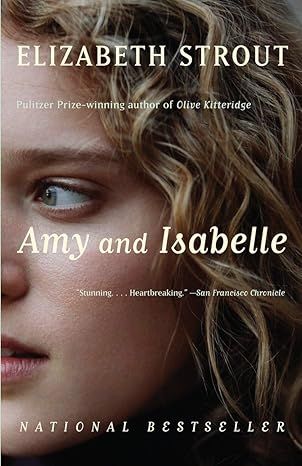
Amy and Isabelle: A novel
4.3
-
9,403
$3.34
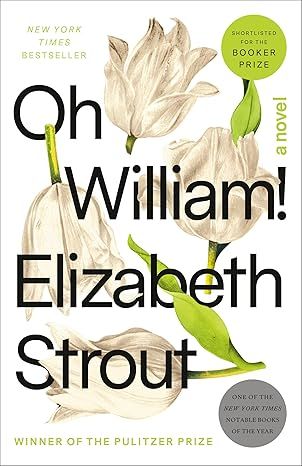
Oh William!: A Novel
4.2
-
22,498
$5.04
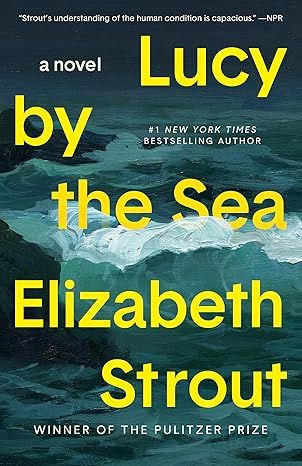
Lucy by the Sea: A Novel
4.3
-
18,461
$4.00
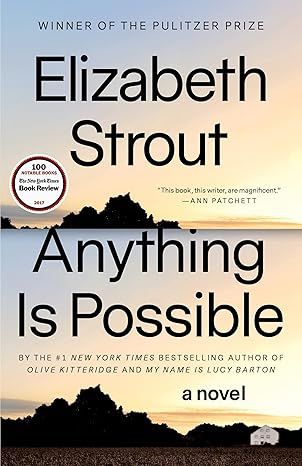
Anything Is Possible: A Novel
4
-
19,323
$5.35
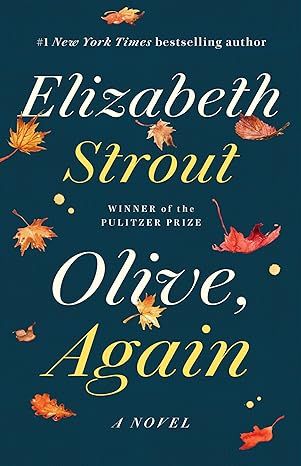
Olive, Again: A Novel (Olive, 2)
4.4
-
24,861
$9.76
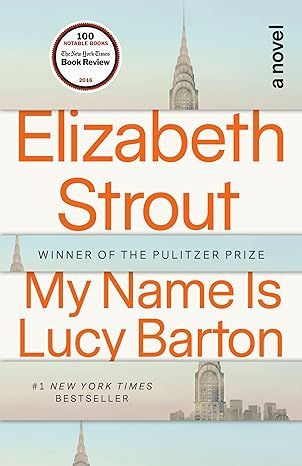
My Name Is Lucy Barton: A Novel
3.8
-
36,168
$7.94
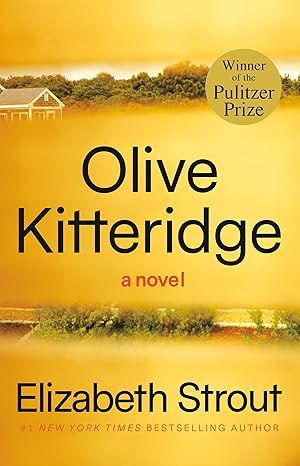
Olive Kitteridge
4.2
-
30,647
$9.49
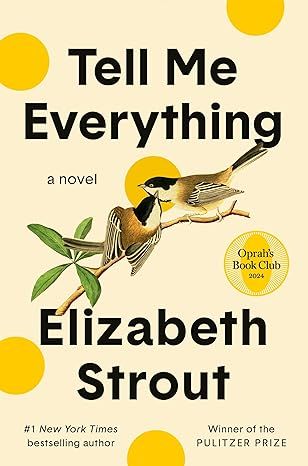
Tell Me Everything: Oprah's Book Club: A Novel
4.5
-
2,665
$14.99
Best Sellers

The Tuscan Child
4.2
-
100,022
$8.39

The Thursday Murder Club: A Novel (A Thursday Murder Club Mystery)
4.3
-
155,575
$6.33

Sapiens: A Brief History of Humankind
4.6
-
140,302
$13.49

The Butterfly Garden (The Collector, 1)
4.3
-
88,556
$9.59

Things We Hide from the Light (Knockemout Series, 2)
4.4
-
94,890
$11.66

The Last Thing He Told Me: A Novel
4.3
-
154,085
$2.99

The Perfect Marriage: A Completely Gripping Psychological Suspense
4.3
-
143,196
$9.47

The Coworker
4.1
-
80,003
$13.48

First Lie Wins: A Novel (Random House Large Print)
4.3
-
54,062
$14.99

Mile High (Windy City Series Book 1)
4.4
-
59,745
$16.19

Layla
4.2
-
107,613
$8.99

The Locked Door
4.4
-
94,673
$8.53
